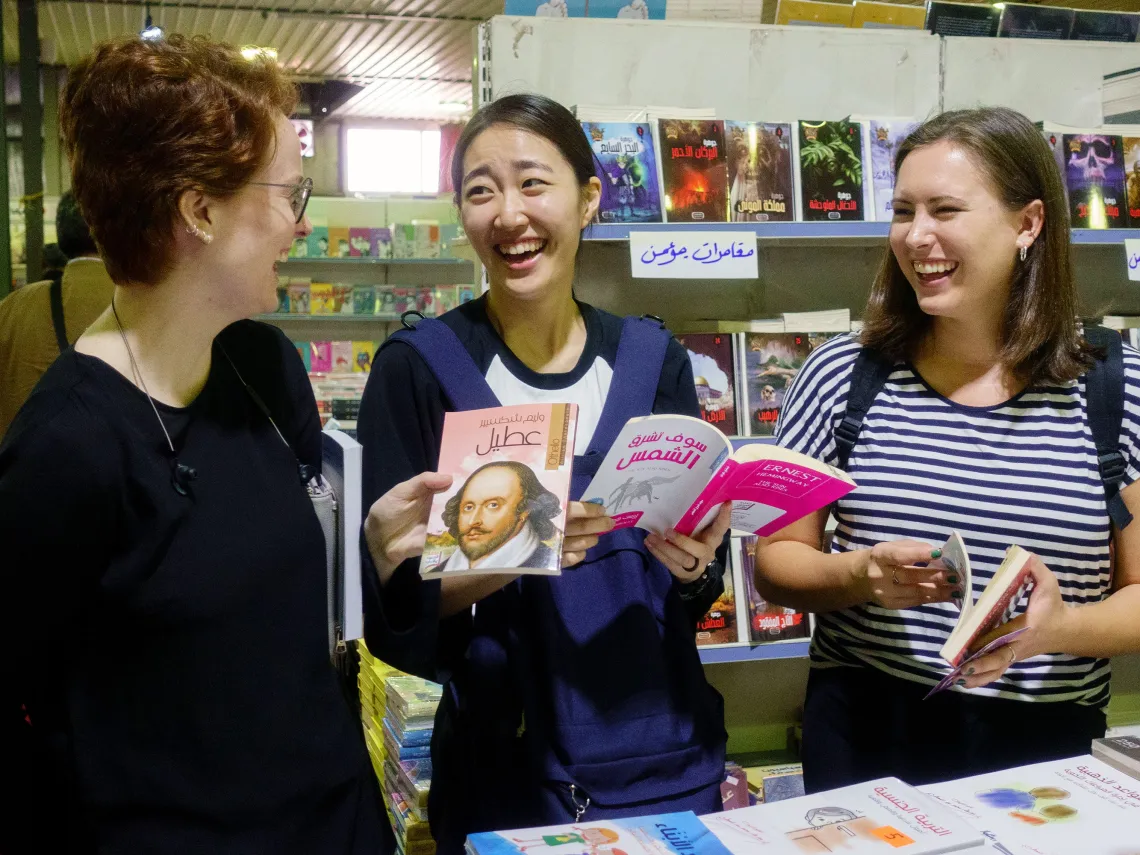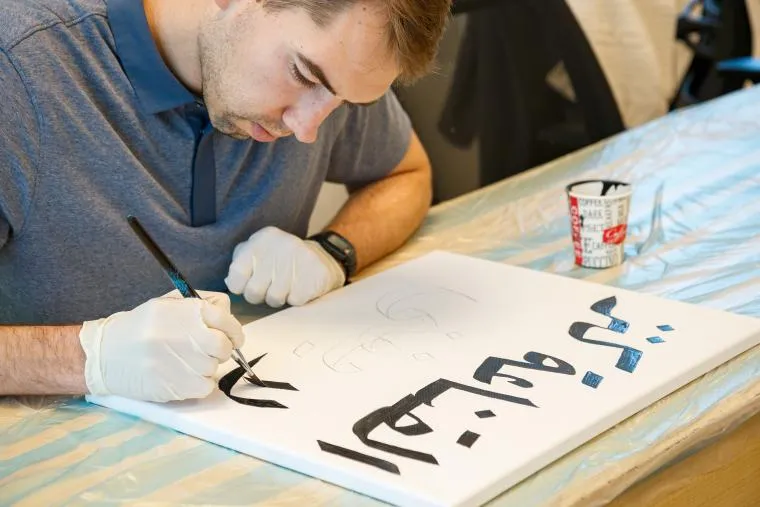Investing in Future Leaders through the Center for Arabic Study Abroad
As the new host of CASA, UArizona is helping train the next generation of experts in Arabic language and culture.

2019-2020 CASA fellows at an annual book fair in Amman.
Every year, a fresh crop of students from across the United States are chosen as fellows of the Center for Arabic Study Abroad, or CASA. CASA fellows embark on a year of intensive study in the Middle East in pursuit of a higher command of the Arabic language and culture.
Acceptance into CASA is considered the pinnacle of Arabic training, and its graduates go on to impact the landscape of Arabic and Middle Eastern studies, as well as U.S.-Middle East policy.
In 2019, the University of Arizona was named the new host of CASA, taking over the responsibility from Harvard University. Sonia Shiri, an associate professor in the School of Middle Eastern and North African Studies, was chosen as the new director.
“This honor further solidifies the University of Arizona’s status as home to one of the best Arabic programs in the country,” said John Paul Jones III, dean of the College of Social and Behavioral Sciences.
The Gold Standard of Arabic Training
The Center for Arabic Study Abroad was established in 1967 to offer year-long, advanced Arabic language training, which is provided at the American University in Cairo, Egypt, and, more recently, at the Qasid Arabic Institute in Amman, Jordan.
Due to COVID-19, it is unclear if or when CASA fellows will be able to travel to either program location for the 2020-2021 program year.

CASA has graduated more than 1700 alumni, who have helped define U.S.-Middle East relations for the last half-century through their work in the U.S. State Department, academic institutions, and the private sector.
CASA is represented by a consortium of 31 universities in the United States. Depending on funding and security issues, CASA accepts around 20-35 fellows a year from across the country. Eligible students are mostly graduate students with a minimum of three years of formal instruction in Arabic.
As the director of CASA, Shiri is shaping the future of the program, working with the governing board, the overseas partner institutions, and fellows. Shiri also collaborates with UArizona Global’s Study Abroad office.
“CASA is a critical program,” Shiri said. “It is widely perceived as the gold standard of Arabic training and is a highly prized, must-have experience for fellows launching into academia, government, or other professions.”
Shiri says she is committed to providing CASA fellows with rich learning experiences rooted in the culture of their Arab host environment yet fueled by cutting-edge research and efficient pedagogical practices.
Excellence in Arabic Instruction at UArizona
“CASA’s move to UArizona demonstrates that the university is a focal point for Arabic study and reinforces the decision I made to pursue my graduate work here,” said Aaron Graybill, a MENAS graduate student.
UArizona is one of only six institutions in the country selected to participate in the Arabic Flagship program, which helps undergraduate students reach superior-level fluency in Arabic. Likewise, the university is one of a few campuses that offer Arabic Project Global Officer, or Project GO, which improves the language competency, regional expertise, and intercultural communication skills of ROTC students. UArizona also offers an Arabic major and a growing Jumpstart Arabic program for high school students and incoming first-year students.
At the heart of this constellation of achievement is Sonia Shiri, who is director and principal investigator of the university’s Arabic Flagship and Project GO programs. Shiri was also elected chair of the Language Flagship Council, representing a consortium of 21 universities and eight languages.
“Dr. Shiri is an energetic and hands-on leader who succeeds in keeping the group morale high, motivating and inspiring students, instructors, and staff alike to work together to achieve levels of Arabic proficiency that are literally off the charts,” said Elizabeth Saylor, an assistant professor of Arabic at Middlebury College, who worked under Shiri’s leadership at UC Berkeley. “The CASA program, in my opinion, could not be in better hands.”
Investing in the Future
While demand for high levels of expertise in Arabic and in the region of the Middle East and North Africa has grown over the past two decades, CASA’s funding has diminished.
CASA has received support from the Department of Education’s Fulbright-Hays Group Projects Abroad program, which, because of reductions over time, now supports tuition and stipends for 15 fellowships at the Qasid Arabic Institute in Amman, Jordan.
CASA benefits from two endowments from the Ford and Mellon Foundations, located at the American University in Cairo. Because of inflation and the increase in tuition costs, this now supports only a couple of fellowships in Egypt annually.
To better respond to this national need in Arabic and MENA regional expertise, CASA needs to grow its capacity for accepting more fellows.
Your support enables CASA to train future generations of Middle East studies faculty, State Department leaders, NGO experts, journalists, and other globally-minded professionals with an understanding of the complex politics and the rich culture and history of this region.
Your contributions would provide a source of current-use funds to address immediate priorities and enable CASA to increase the number of fellows. Larger gifts (including bequests) could be added to CASA’s small endowment to boost long-term impact.
You can donate to the program at casa.sbs.arizona.edu/support.
##
This article was part of the 2020 SBS Developments magazine.

